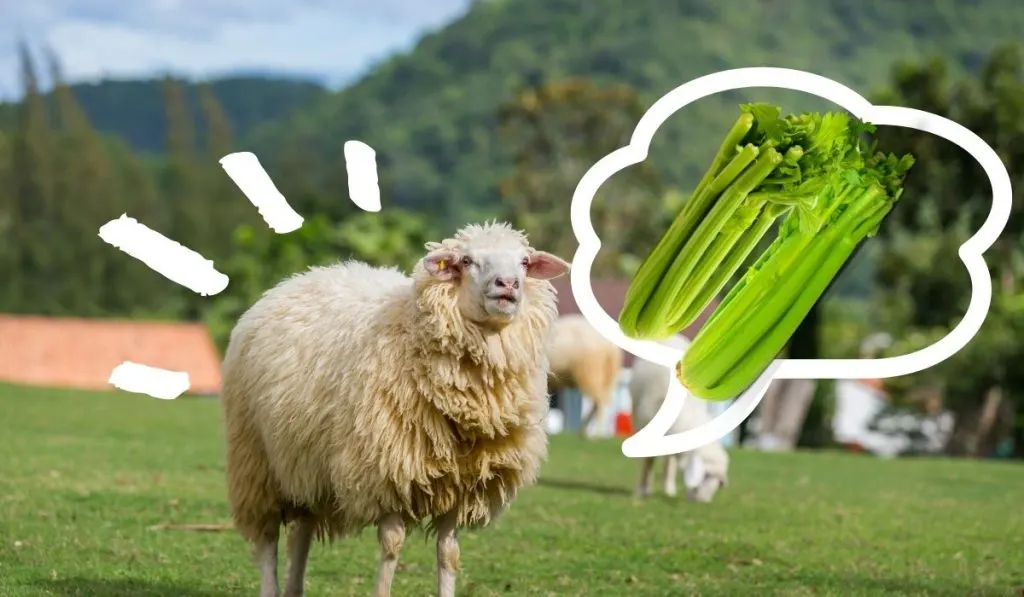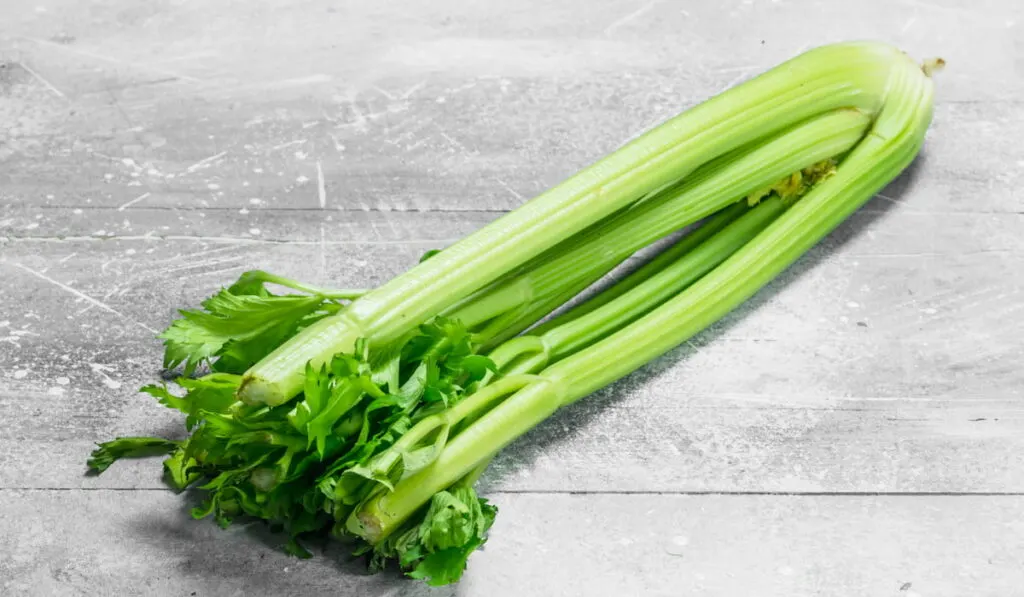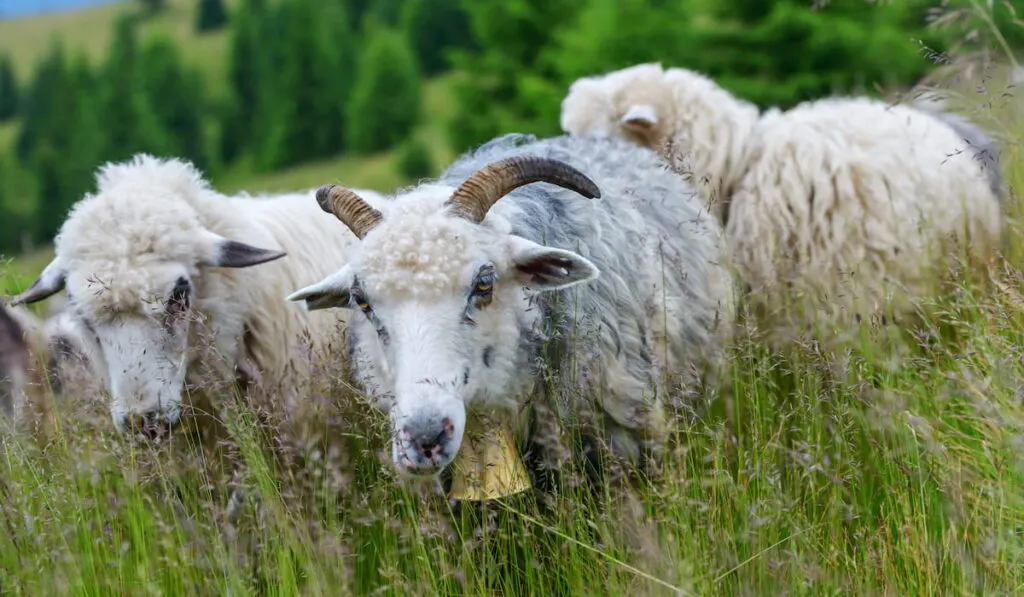Sheep are not very picky when it comes to food, so they might easily eat plants they shouldn’t consume – just because they are there.
Celery is a valuable part of the human diet, which is why there are questions and studies on if sheep can eat it too without experiencing some negative side effects.
The answer is yes, sheep can eat celery. But there are some things you should know before offering it to them.
What Do Sheep Eat In General?
Their primary diet mostly consists of hay.
Sheep are grazing ruminant animals, and just like goats, deer, elk, and cattle, they have four stomach chambers.
When they eat too much of the food they are supposed to eat or smaller amounts of things they’re not recommended to eat, their rumen gets out of whack.
This can lead to bloating and other health disruptions.
So the best choice for your sheep is a combination of pasture and hay.

It’s even better than formulated or grain food specifically intended for sheep, since those can be too caloric or too rich in nutrients compared to what they need to stay healthy.
It is best for your sheep to eat around 0.03 pounds of hay or grass per pound of their overall body weight on a daily basis.
Of course, if you have a very young or old sheep, a new mother, or an ill one, adjust the amounts to that particular condition.
Coupled with that – they eat more when it’s colder outside.
The best would be a combination of mixed grasses and different clovers. They also need to consume around a pound of fiber per day.
Sheep need to eat approximately a pound of fiber each day.
If your sheep is not getting enough of it from the food it eats, you’ll notice it may nibble on wood or even the wool of some other sheep – to make up the fiber they are lacking.
Because of their rather complex digestive system, they need to graze a lot (around eight or nine hours a day)in order to ferment and then absorb the valuable nutrients out of the food.
With this in mind, whichever other foods you’d like to add to their diet, make sure you do it gradually.
If they eat too much of new ingredients, it can cause bloating or some other medical issues.
So, What About Celery?
Celery is a great source of valuable minerals, fiber, calcium, potassium, manganese, and vitamins A, B2, B6, C, and K.
Sheep can also consume it to absorb antioxidants, chemical elements that protect cells against free radicals. Those are molecules that damage our cells and may cause certain health disruptions over time.

In the case of sheep, it’s important for them to consume foods rich in antioxidants to keep their production levels high.
So with all that in mind, sheep can eat celery.
Experts say they are animals that will find both celery and many other vegetables rather palatable, so they’re more than willing to eat them.
As a matter of fact, research shows humans and animals have similar requirements when it comes to the type of nutrients and minerals found in vegetables.
It’s just we need different amounts, which is why, yes, you can treat your sheep with some delicious veggies – but not too often.
In perfect circumstances, vegetables are a supplement sheep should occasionally get, not a potential replacement for hay or other foods their primary diet contains.
You can both cook the celery or serve it raw; either way, avoid adding seasonings and sauces unless you’ve checked if those items are safe for your sheep.
Wilted celery is also fine for the animal. However, avoid giving it rotten celery or, in general, any vegetables with mold on them.
One more thing – whichever way you serve it, slice the celery into smaller bite-sized pieces so the sheep doesn’t choke.
What Other Fruits and Vegetables Can Sheep Eat?

Vegetables are rich in valuable nutrients, which makes them a perfect addition to your sheeps’ diet.
With this in mind, there are more vegetables you can give your sheep besides celery, such as carrots, lettuce, carrots, pumpkin, and squash.
If you want to try fruits too, you can offer grapes, apples, pears, or watermelon.
Your sheep will also enjoy oats as an occasional treat.
What Sheep Shouldn’t Eat?
Be careful when giving them kale or even rhubarb. Some parts of these plants are toxic to them.
Unlike goats, sheep can’t tolerate too much copper, so pay attention to avoid giving them foods high in copper.
This element can accumulate in their liver and result in symptoms even a year later.
If sheep get copper poisoning, you’ll recognize it from teeth grinding, bloody urine, poor appetite, fragile bones, or poor wool coverage.
Too much grain can also lead to some health issues such as dehydration and thirst, bloating, or diarrhea.
Sheep also shouldn’t eat avocados, potato weed, plum trees, raw potatoes, English Ivy, oleander, horsenettle, and azaleas.
Some Final Words
So, should you give your sheep celery?
The answer is simple – yes, you can add it to their diet.
However, make sure not to give them too often. Celery is an addition that shouldn’t replace their primary foods.
If the celery or some other veggies sheep are allowed to eat are just an occasional treat, you avoid potential medical issues they might get if they overeat something they don’t consume regularly.
Offering them small and not too frequent amounts will help them get some valuable nutrients out of the celery or other veggies and stay healthy.
